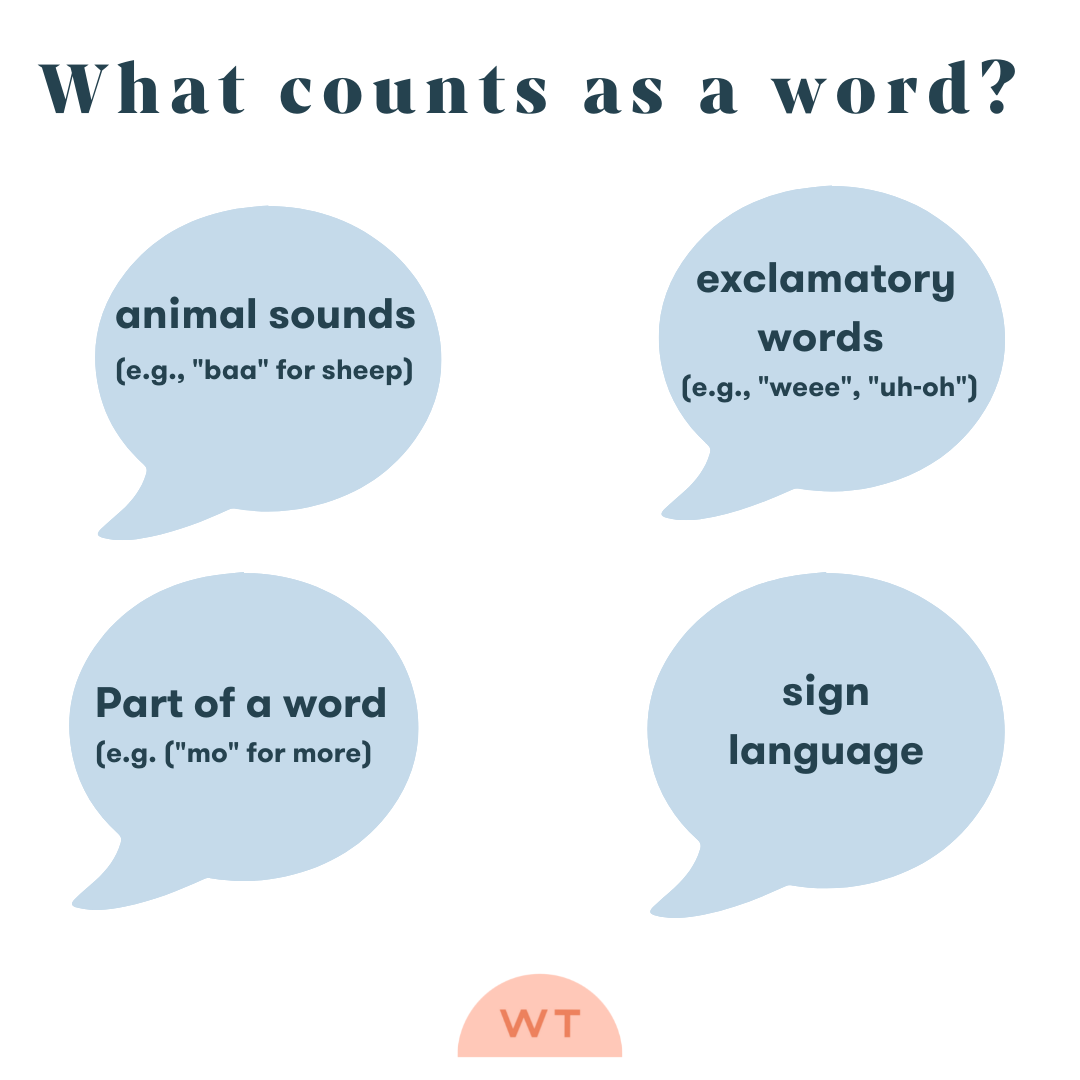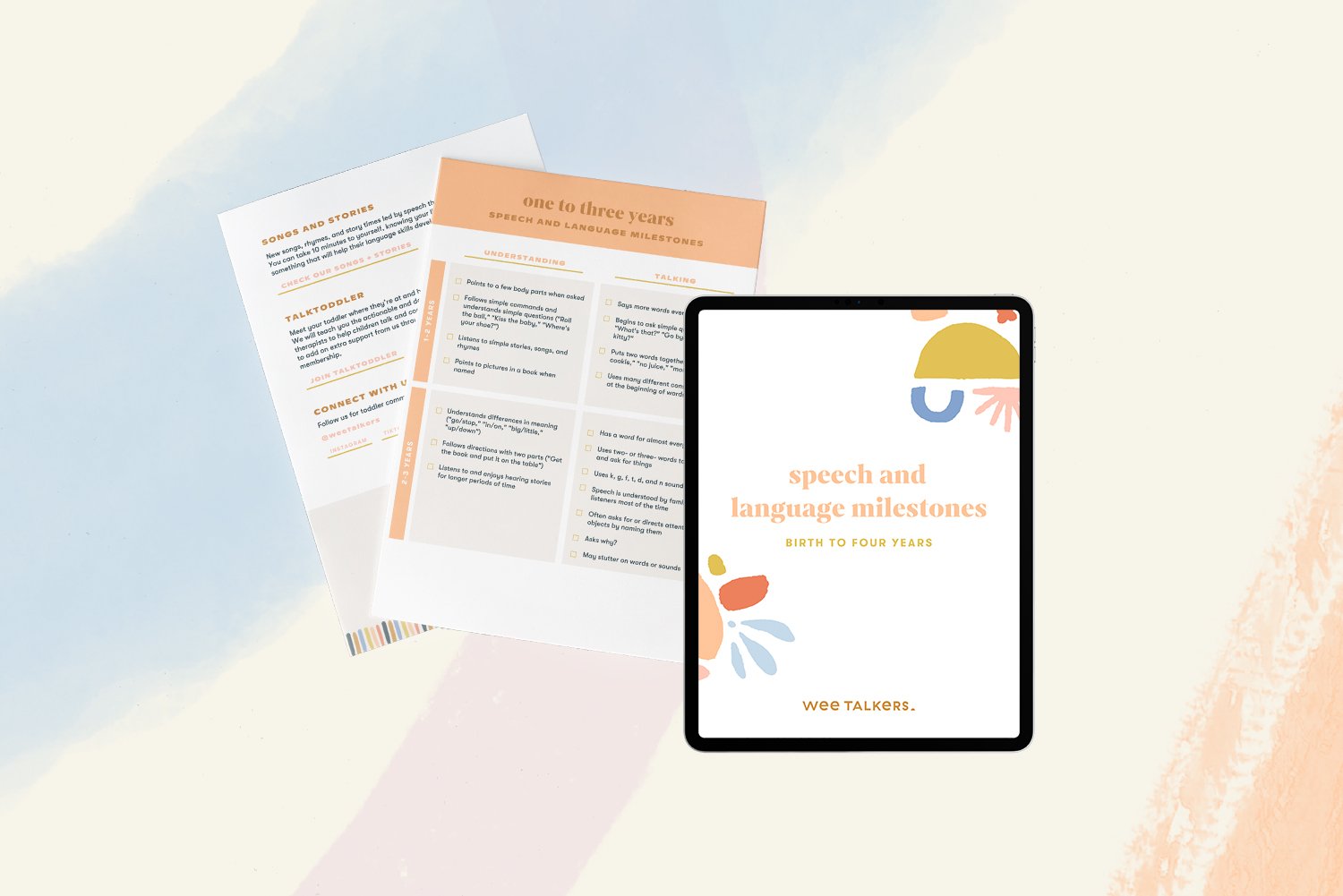My 18 Month Old Isn't Talking Yet: What to Know and How to Help
If your 18-month-old isn’t talking much yet, we bet you’re receiving mixed messages. And feeling all kinds of feelings.
Friends with talkative kids make it look easy—and make you wonder if you did something wrong. (You didn’t.)
Parents and pediatricians tell you to “Just wait and see. They’ll probably catch up by two.” Which makes you wonder if you’re overreacting. (You’re not.)
All you want is to do what’s best for your child. But you’re not sure who’s right, and the stakes feel really high! We’re here to help you make it all make sense.
In this post, we’re going to help you understand where your child’s speech development is at, whether or not you need to worry, and what your next steps should be.
We’ll let you in on the early language development milestones speech therapists use to track toddler speech development. Then, help you figure out which ones your child is meeting—and which ones they might not be. And finally, we’ll share speech therapy tips you can use to encourage your toddler’s speech at home.
This speech thing is about to get a whole lot less scary and stressful 💛
Let’s get into it!
Overview:
The Truth About Milestones & Toddler Speech Development
When you think of speech development, you probably go straight to talking. Most parents do! But there’s so much more to it than that.
Toddlers don’t just say words spontaneously or start talking one day out of the blue. Instead, their ability to communicate builds up slowly and steadily over time as they master smaller, more subtle language skills. We often refer to these as “building blocks of language” or “pre-talking skills”, but the official name for them is “milestones”.
It’s important to know what these milestones are because they’re what speech therapists use to determine whether or not your child’s communication development is on track!
If your child is meeting most of the milestones for their age, that’s a good sign that even though they’re not talking yet, they’re gaining the foundational language skills they’ll need to talk when they’re ready. They may just need a little time and encouragement!
If they’re not, that’s a sign that they would likely benefit from a speech and language evaluation. We know it probably feels big, but try not to panic. It will be okay. We’ve got more info and advice on this below—and you can always reach out to us, too.
Figure Out Where Your Child Is At [Free Milestones Checklist]
There are 30+ milestones that speech therapists use to evaluate a toddler’s speech development. We put them into a free checklist that you can use to measure your child’s progress and see if they’re on track.
Download the list and spend a minute checking off what your child can do to get a better idea of where they’re headed next (and what they might need support with).
How Many Words Should an 18-Month-Old Say?
Before we get into it, it’s important for you to know that while the number of words your toddler can say is a milestone, it’s just one of many. There are many other early language milestones we’d expect a toddler to have mastered by 18 months old—things like understanding what you say, making a variety of consonant sounds when they babble (like p, b, m, t, w, and k), and looking toward you when you call their attention. So while this matters, it is not everything!
All of that said…
By 18 months of age, we would expect your toddler to say at least 10 to 50 words. And, by 24 months old, they should use somewhere between 50-300 words and be able to combine 2 words together. We would also expect toddlers to use different kinds of words—like a mix of nouns, action words, prepositions, and adjectives. And social words, like “hi” and “bye.”
Some parents are surprised to hear these numbers. So let’s chat about what “counts” as a word. (Hint: It’s more than you think!)
What Counts As A Word?
Anything your child says intentionally, consistently, and in the right context counts as a word. This tells you it’s not just a happy accident or a random sound, but that they’re actually saying that word to communicate something with you on purpose.
Other things that count as words (and might surprise you!) are:
Animal sounds “baa” for a sheep
Exclamatory words like “wee!” and “uh-oh!”
Parts of words, like “mo” for more or “ba” for ball.
Common first words are “mama”, “dada”, “hi”, “more”, “ball”, “dog”, and “milk.” (Even if they sound like “ma” for mama, “mo” for more, and “ba” for ball!)
We know that counting “ba” as a word might seem a little too easy. After all, they could say “ba” for banana, ball, and baby, and if they said each one intentionally, consistently, and in context, then “ba” would actually count as 3 different words! But there’s a reason why we’re so flexible with the way your child’s words sound at this age.
By 18 months old, toddlers can often communicate more than they are physically able to say. It’s very normal for them to not be able to make every speech sound yet—some don’t develop until age 4 or even 5! So we want to focus more on the meaning behind what they’re saying than them pronouncing every part of the word perfectly.
understanding is a really good sign!
If your 18-month-old isn’t talking much yet but understands what you say, that’s a really good sign!
Communication breaks down into 2 smaller skill sets:
Receptive skills (understanding)
Expressive skills (speaking)
When we think of language development, we often think of talking alone. But that’s actually only half of the picture. Maybe even less, considering some kids don’t talk but have so many other rich communication skills!
By being able to comprehend the spoken language they hear, your child is demonstrating strong receptive language skills. That tells us that some of the foundational skills for learning to communicate more are already in place.
If your 18-month-old isn’t talking yet, we want you to start paying attention to the other ways they’re communicating with you. Many of these skills are actual communication milestones. Mark them off on your milestones checklist as your toddler achieves them. Or, if they seem to be stuck on one, use that knowledge to get them the support they need to advance.
nonspeaking Communication Skills & Milestones
Pointing to body parts when asked
Following simple commands and understanding simple questions
Listening to and showing interest in simple stories, songs, and rhymes
Pointing to pictures in a book when named
Don’t Wait and See. Support and See!
By now, we hope we’ve made it clear that “number of words” isn’t enough to tell us whether or not your toddler has a speech delay. Instead, we want to look at how your child’s language is developing overall. (And, we hope this is a little encouraging to you. It means your child’s development can’t be reduced down to one little number!)
If your toddler is meeting most of their milestones but isn’t saying many words yet, they may be a late talker, meaning there’s no true delay, but they’re taking their time to talk. On the other hand, if they’re behind on multiple milestones, that’s a sign that they could have a speech delay.
Either way, we recommend that instead of taking the “wait and see” approach, you “support and see”. Because while it’s true that some kids do catch up on their own, we won’t know which ones will and won’t until after it’s already happened! So it’s always best to assume that your child will need support and get it for them. Worst case scenario, they catch up and you can stop the support early!
For some kids, support looks like speech therapy. But others just need a little encouragement! So next, we’ll teach you 3 simple ways to give your toddler a little speech encouragement from home.
3 Ways To Encourage Toddler Speech At Home
Toddler speech development is complex, but a lot of the strategies we use to help them make progress are actually really simple.
Here are 3 tips we always teach the parents we work with:
#1 Ask Fewer Questions
Toddlers don’t like feeling pressured to talk. So learning to talk shouldn’t feel like a test.
We always see more success with little ones when communication feels positive and fun! You can help achieve that vibe by asking fewer questions. This really decreases the pressure, especially while you’re playing with them.
Watch this tip in action:
#2 Start With Fun Sounds
Speech is a complex skill that takes time to develop. Instead of trying to get your toddler to label things or pictures, try showing them “fun sounds” like wee, uh-oh, brrrrm (for a car), and wow! These sounds are often more accessible for toddlers and they’re more engaging, too.
Watch this tip in action:
#3 Repeat, Repeat, Repeat
Toddlers need to hear words many times before they say them on their own. Repeat words that are important to your toddler often. Especially during daily routines like mealtime, dressing, and bathtime. This repetition will pay off!
BONUS: Use a sing-songy voice as shown in this video, to really help it stick!
Watch this tip in action:
Want step-by-step guidance? Check out TalkToddler!
Our TalkToddler course is your shortcut to helping your toddler say more words without adding more to your plate. It’s full of easy strategies that are based on speech therapy practices—but just feel like fun ways to play together and connect! And it comes with printable resources that let you track their progress as you go.
(Oh, and it’s super affordable, too.)
When To Get A Speech & Language Evaluation
We are all for doing what you can to encourage language development at home. But there are definitely times when professional support is needed. If your child isn’t meeting milestones for their age, or if you just have that gut feeling as a parent, seek out a speech and language evaluation.
Signs Your Toddler Might Need A Speech Evaluation:
Family History of Speech/Language Delays or Disorders
History of Chronic Ear Infections
Difficulty Understanding Language (E.g, Simple Directions, Familiar Vocabulary)
Decreased Play Skills (Not playing in the way you would expect)
Limited Number Of Consonant Sounds
Regressing In Vocabulary
Not Using Gestures
There’s never a bad time to get your child the support they need. And if it turns out they don’t need it—great! At least you’ll know.
If Your 18-Month-Old Isn’t Talking Yet [Parent Action Plan]
If your 18-month-old isn’t talking at all yet or only has a few words, you should:
#1 Learn the toddler communication milestones. Figure out where your child is at and which skills you can expect them to demonstrate next. Meeting them where they’re at is key to helping them make progress!
#2 Encourage speech development at home. Use the free tips we shared in this post and follow us on Instagram for more like them!
#3 Join us in TalkToddler for step-by-step guidance on what to do. It’s perfect for families who don’t need speech therapy but want some structured help, kids who don’t qualify for speech therapy but still need support, and parents who want to do more at home to support what their kids are doing in speech therapy.
#4 See a speech therapist if ever you’re concerned or your child stops meeting milestones.
#5 Try not to worry. Remember, this is not your fault at all. By getting your child the support they need and educating, you’re being an incredible, intentional parent!
In it with you,
Carly+Katie
**Carly and Katie are pediatric speech-language pathologists with over 25+ years of combined experience, but first and foremost, they’re parents–just like you. Between them, they have six kids and they all have unique and different needs. They know that the most impactful strategies are things that any caregiver can do at home. The TalkToddler course was made just for you, from start to finish! They took much of what they do as therapists and broke it down into the most actionable steps. We’ve even included examples with real parents so you can see everything in action.
References
How To Tell If Your Child Is A Late Talker. Lauren Lowry, Hanen Certified Speech-Language Pathologist. The Hanen Centre. Accessed September 30, 2021.
Late Talking and the Risk for Psychosocial Problems During Childhood and Adolescence. Whitehouse, Zubrich & Robinson. 2011. DOI:10.1542/peds.2010-2782
Language Outcomes of Late Talking Toddlers at Preschool and Beyond. Roos & Weismer. 2008. doi: 10.1044/lle15.3.119
Important Milestones: Your Child By Eighteen Months. Center for Disease Control, August 2021. Accessed September 30th, 2021.





